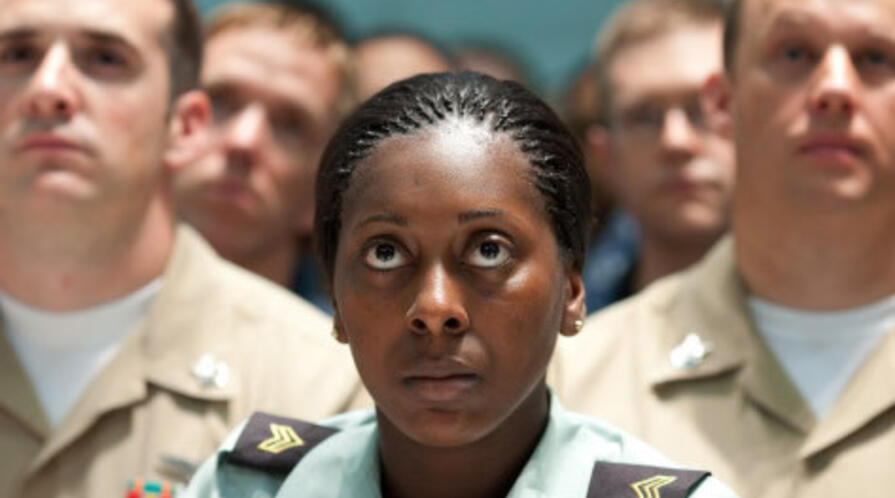The ethics of the draft

Who should fight? It is no idle question in an era in which thousands of U.S. troops are fighting and dying in Afghanistan and Iraq to protect Americans back home. In fact, the answer has profound consequences for the way policymakers make decisions about how these wars are waged. On Dec. 2, scholars from Stanford, the University of Chicago, and the School of Advanced International Studies at Johns Hopkins University examined this issue as part of the Stanford Ethics & War Series (2010-2011), co-sponsored by the Center for International Security and Cooperation. Their conclusion: there is a wide and troubling divide between the 2.4 million Americans who volunteer to serve in the military and the many millions more who choose not to.
The statistics are revealing: During World War II, some 16 million men, and several thousand women, served in the military, representing 12 percent of the U.S. population. They came from all walks of life, and those who stayed home made sacrifices of their own for the greater war effort. But while the U.S. population has more than doubled since then, the military is now just 4 percent of the size it was in the 1940s. At the same time, today's wars require virtually no sacrifice at home, and those who enlist come from an extremely narrow demographic segment of the U.S. population. According to Stanford historian David Kennedy, who spoke at the event, in 2007, only 2.6 percent of enlisted personnel had exposure to college, compared to 32 percent of men age 18 to 24 in the general population. The military is disproportionately composed of racial, ethnic, and other demographic minorities, he noted. The political elites making the decisions about warfare seldom have children serving. Among the 535 elected members of Congress in 2008 only 10 had children in the military.
The implications of this are vast. A lack of personal familiarity for many Americans with the military breeds to some puzzling behavior, says Eliot Cohen, the Robert E. Osgood Professor of Strategic Studies at the Paul H. Nitze School of Advanced International Studies. Congressmen say they can't imagine U.S. troops committing the kinds of atrocities recorded at the Abu Ghraib prison in Iraq; left-leaning anti-war advocates at Moveon.org refer to General David Petraeus, the highly regarded commander of the wars in Iraq and Afghanistan, as General Betray Us. More than that, a large gap between those who make the decisions about war and those who fight it raises serious questions about accountability. The Vietnam-era draft inspired thousands of Americans to push back against Washington's decisions to expand the war. Conversely, the existence of the all volunteer army, in effect since 1973, may have one been one reason for the relatively smaller level of protest in the run up to, and the execution of the wars in Afghanistan and Iraq. Indeed, at a 2006 Oval Office meeting with President George W. Bush, Kennedy said the president told him that if the draft had been in place he "would have been impeached by now."
The gap also raises concerns about civic unity. Earth-shaking events such as World War II and Sept. 11 brought citizens together, says Jean Bethke Elshtain, the Laura Spelman Rockefeller Professor of Social and Political Ethics in the Divinity School at the University of Chicago. But sustaining that unity is extremely difficult, and becomes even more so when one segment of the population is willing to give its life to protect Americans while the vast majority go on with their lives without making any sacrifice of their own. To Elshtain, this raises a basic issue of fairness and social justice. There is a general lack of equity, she says, when "some families bear a radically disproportionate burden of service and sacrifice." As their peers "study or work or frolic, they die" in Iraq or Afghanistan.
Redressing this imbalance is an extraordinary challenge. Surely a draft would help. But it raises ethical questions of its own. There is also no political will to reinstate it. Nor, says Cohen, is it necessary or even desirable from a military perspective. A better set of solutions, he suggests, would start with expanding the depth and scope of relations between civilians and military personnel. He recommends siting military bases around the country so that civilians in New England, say, where there is virtually no military presence, can have greater exposure to an institution about which many of them know very little. Elite universities such as Stanford and Harvard, which have long prohibited on-campus ROTC activities, should start revisiting and revising their policies so that over time the military will have a wider diversity of background. Doing so might enrich the campus experience, and it could also lead to a stronger military in which the highly educated graduates of America's elite educational institutions would take a greater role influencing America's elite military institutions. For now, Kennedy observes, we have effectively "hired some of the least advantaged of our fellow countrymen to do some of our most dangerous business." And we continue down this path at our peril.
